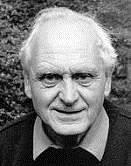STEPHEN DODGSON
Born March 17 1924, Died April 13 2013

Obituary by Tim Reynish
Stephen Dodgson was one of the most important, and neglected, composers for wind and brass of the past half century. Best known for his enormous output for guitar, music championed by Julian Bream and John Williams, he was almost equally prolific writing for wind orchestra and wind and brass ensembles. He studied at the RCM under R.O.Morris and Patrick Hadley, returning in 1965 as Professor of Composition, having already written several significant works for guitar. In 1974 his Wind Symphony was premiered by the National Youth Wind Orchestra under Harry Legge, and in 1986 he became chairman of the Orchestra.
He was closely associated with the Philip Jones Brass Ensemble for many years, writing a series of exciting chamber works for them. It was at Philip’s suggestion that I conducted at the RNCM his Wind Symphony back in the mid seventies, the first work that I conducted at the College. With so much music to learn and conduct, it made little impact at the time, and revisiting it now I must confess to having no recall of its material. Maybe the wind orchestra, without the benefits of the warmth and richness of the strings, demands bright exciting gestures. There is a recording commercially available by the Band of HM Royal Marines conducted by Chris Davis, on which the Symphony is sandwiched between Montage by Peter Graham and Earth, Water, Sun, Wind (Symphony No 1) by Philip Sparke both works couched in that kind of lingua franca of contemporary wind composers, with influences perhaps from Walton, Copland, Bernstein, sometimes trivial and derivative, always highly tonal and highly effective. Dodgson was very influences by the music of Janacek, and there is an Angst there perhaps evocative of that period of 20th century music, and there is certainly a serious intent.
In the 1980 edition of Grove, fellow composer Hugo Cole writes of his music being designed to divert and charm rather than to edify or promulgate great truths…. His instrumental music is distinguished by skilled and discriminating handling of the materials of music; ….his music is always civilised, thoughtful, and marked by a distaste for extreme gestures.

WIND SYMPHONY
Prologue - Scherzo - Interlude - Procession
Not for Dodgson the easy way out. The Symphony opens with an evocative clarinet solo and an extensive working out of motifs for woodwind soloists, then for the trumpet choir. The scherzo which follows has considerable rhythmic energy, with much fugal imitation and strong lines for the brass. As a horn player, he is well aware of the importance of writing lyrical lines for all the families, even in a scherzando movement. The Interlude perhaps owes something to the Night music interludes of Bartok in his symphonic works, very atmospheric, while Procession has some splendid ceremonial music, but without the obvious clichés of the wind symphony. You have the feeling that this is significant music, well worth exploring and performing.
My favorite work by Stephen is his Capriccio Concertante (1984) for Clarinet and Wind Band written for the Surrey County Wind Orchestra and its principal clarinettist, Michael Collins, at about the time he won the wind section of the BBC Young Musician of the Year.
Subtitled 'All Hallows Eve', there is a spooky, if frivolous, quality about the music. The work is basically in three parts, though there are five sections played without a break: Premonitions, Dance & Skirmish, The Strokes of Midnight, The Revels Resumes, and Dawn for All Saints. Premonitions serves as an introduction - it begins gently with the woodwind's tolling bells motive from the Strokes of Midnight, a motive which returns in the final bars of the piece, then briefly foreshadows the playful Dance and Skirmish Allegro with its changing metres. Both soloist and ensemble race across metric changes in the first part of the Dance, before a short largamente gives all a chance to catch some breath, before the return of the Allegro, now 'di molto'. The central Lento, The Strokes of Midnight, allows the soloist a recitative-like freedom, as the final toll always provides a sustained foundation for a longer melody. The Revels Resume with the Skirmish music, this time moving to Allegro di molto without a rest, and finishing with a virtuoso piccolo and solo clarinet duet. The bell toll interrupts three times before it descends into the gentle final movement.
SYMPHONIC GALLERY The Band of HM Royal Marines Conducted by Lt Col CJ Davis Montage Peter Graham (Symphony for Wind Orchestra) Wind Symphony Stephen Dodgson Earth, Water, Sun Wind Philip Sparke Symphony no 1 To order at £5.00, browse on the CD cover above and follow the links |
Wind Symphony (1974)
The Eagle (1976)
Matelot (1977)
Capriccio Concertante (1984)
Marchrider
Flowers of London Town
For information about availability of scores and parts, go to Denis Wick Publishing – browse below
